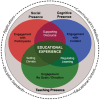Facilitators and barriers to online group work in higher education within health sciences - a scoping review
- PMID: 38608002
- PMCID: PMC11018044
- DOI: 10.1080/10872981.2024.2341508
Facilitators and barriers to online group work in higher education within health sciences - a scoping review
Abstract
Introduction: In health education, group work is essential to prepare students for working in health care and medical teams. Following the widespread adoption of online teaching, group work increasingly takes place in online environments. Although successful group work can provide good learning outcomes, it is unclear what facilitates or hinders online group work in health science education, and to what extent this topic has been addressed. Thus, this scoping review aimed to identify the facilitators and barriers to online group work in higher health education, provide an overview of the scientific literature related to the topic, and identify knowledge gaps in the research.
Methods: This scoping review was guided by the methodological framework described by Arksey and O'Malley, and reporting is in accordance with Preferred Reporting Items for Systematic Reviews and Meta-Analysis Extension for Scoping Review (PRISMA-ScR). Eight online databases were searched for scientific articles published between 2012 and 2022. At least two researchers independently screened records and full-text articles and charted data including article characteristics and key information related to the research question. Findings were categorized and summarized based on the Community of Inquiry Framework.
Results: After screening 3671 records and 466 full-text articles, 39 articles met the inclusion criteria. The review revealed smaller group size, consistency in group composition and joint responsibility to be facilitators. Challenges with group communication, scheduling synchronous meetings and technical issues were identified as barriers. Our findings supported the importance of all three elements of the Community of Inquiry Framework: social, cognitive, and teaching presence.
Conclusion: This review provides an overview of facilitators and barriers to online group work in health science education. However, there is a need for further investigation of these factors and studies addressing this topic from the teachers' perspective.
Keywords: Online group work; community of inquiry framework; health education; health science; higher education; online education; scoping review; student group work.
Conflict of interest statement
No potential conflict of interest was reported by the author(s).
Figures


References
-
- Gillies R. Cooperative learning: review of research and practice. Australian J Teacher Educ. 2016;41(3):39–19. doi: 10.14221/ajte.2016v41n3.3 - DOI
-
- Lou Y, Abrami PC, Spence JC, et al. Within-class grouping: a meta-analysis. Rev Educ Res. 1996;66(4):423–458. doi: 10.3102/00346543066004423 - DOI
-
- Slavin RE. Research on cooperative learning and achievement: what we know, what we need to know. Contemp Educ Psychol. 1996;21(1):43–69. doi: 10.1006/ceps.1996.0004 - DOI
-
- Johnson RT, Johnson DW. An overview of cooperative learning. In: Thousand J, Villa A, and Nevin A, editors Creativity and collaborative learning. Baltimore: Brookes Press; 1994. p. 14.
Publication types
MeSH terms
LinkOut - more resources
Full Text Sources
Miscellaneous
